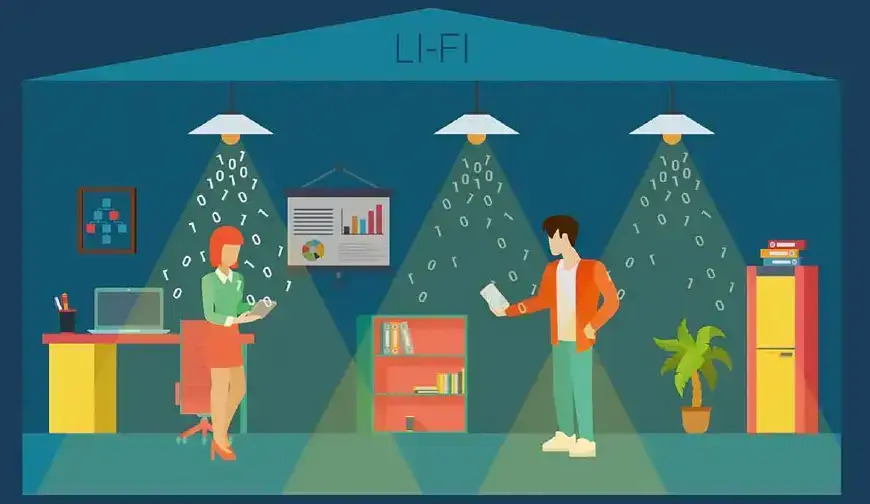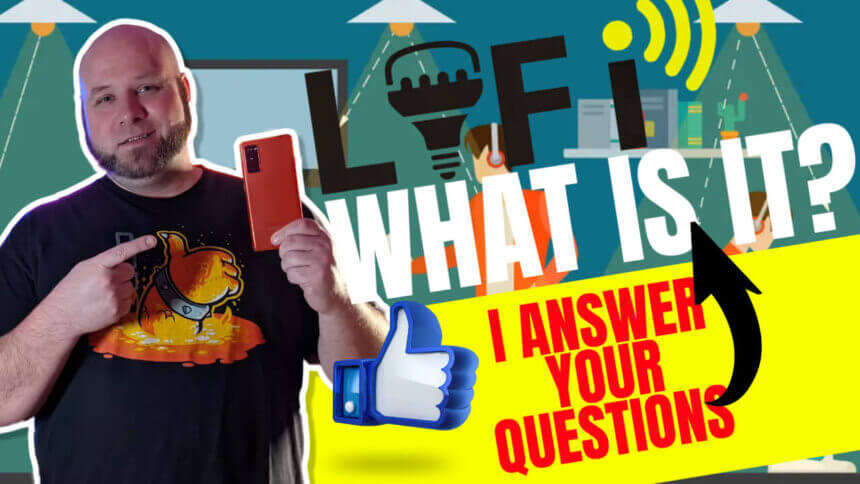Introducing LiFi Technology: It’s Lit!
Forget WiFi drops and lag – there’s a new wireless network in town that’s as fast as light! LiFi, or Light Fidelity, sends data through LED light waves at blistering speeds up to 224 Gbps. That’s 100x faster than WiFi! While WiFi uses radio frequencies, LiFi transmits via rapid light modulation that’s undetectable to the human eye. This light-based system brings ultra-fast, secure connectivity to your home without any of the clogged airwaves of WiFi. Get ready to level up your household bandwidth to light speed!
How Does LiFi Work?
When power is applied to an LED bulb, it emits a constant stream of light particles or photons. LiFi works by turning this light on and off at extremely high speeds to transmit digital data as light signals. An optical sensor on your device detects these light fluctuations and converts them back to binary code.
LiFi bulbs contain a small microchip that modulates the light in response to data fed into the bulb. These rapid light changes are too quick to be noticed by the human eye, so the illumination appears constant. The LiFi receiver extracts the data from the light signal and voila! You’re browsing at the speed of light!





TL;DR
- LiFi transmits data 100x faster through LED lights – think 224 Gbps!
- It brings wireless connectivity via light modulation instead of radio waves.
- LiFi leaves WiFi in the dust with more capacity, efficiency and security.
- LiFi@Home ecosystems bring light-speed connectivity to households.
- With LiFi, the light at the end of the bandwidth tunnel is finally in sight!
LiFi Advantages vs WiFi Disadvantages
While WiFi uses radio waves that penetrate walls and travel far, LiFi transmits via light that remains confined to a specific area. This gives LiFi some key advantages:
Speed – LiFi maxes out at a blazing 224 Gbps, while the fastest WiFi tops out at 9 Gbps.
Capacity – LiFi can support over 1,000 times more data density than WiFi.
Efficiency – LiFi uses 10,000 times less energy than WiFi.
Security – Light can’t penetrate walls, so LiFi signals are confined to a room. No more noisy neighbours leaching your network!
Availability – The light spectrum has 10,000 times more availability than crowded radio bands.
Reliability – LiFi provides full-speed connections with no network congestion or lag.
The bottom line? LiFi leaves WiFi’s bandwidth bottlenecks and security flaws in the dust with light speed and low latency connections!
LiFi Applications for Homes
With homes crammed full of bandwidth-hogging devices, WiFi networks are feeling the strain. Introducing LiFi@Home – the first LiFi ecosystem designed for the home!
At the heart of LiFi@Home is a smart LED downlighter that bathes a room in infrared light imperceptible to the human eye. This LiFi access point uses light waves rather than radio to deliver reliable, high-speed connectivity to all your household devices.
Simply connect your smartphone or TV to the LiFi network when your WiFi starts to lag. By offloading devices to the LiFi network, you free up precious WiFi bandwidth for the rest of your home.
With a practically unlimited light spectrum, LiFi@Home brings an end to household connectivity bottlenecks. Stream 4K movies, games, and videoconferences simultaneously across all your devices without interruption!
The Growing LiFi Market Size
The global market for LiFi technology is projected to grow from $570 million in 2022 to over $75 billion by 2030 as costs drop and new applications emerge. With the LiFi market poised for massive expansion, forward-thinking startups are pioneering clever LiFi ecosystems for homes, offices, industry and beyond!
LiFi Startups Pioneering the Technology
- LiFi industry leaders like pureLiFi and Signify are commercializing LiFi for mass adoption.
- Remotely locate devices and assets indoors via LiFi with NavVis.
- Velmenni brings LiFi to VR/AR for next-gen experiences.
- Oledcomm embeds LiFi in car LED headlights for vehicle-to-vehicle communication.
These innovative startups are demonstrating the versatility of LiFi across industries. As research continues, the applications of LiFi are virtually limitless!


Ongoing LiFi Research and Standards
LiFi research is rapidly evolving with over 10,000 related patents filed worldwide. The IEEE is developing new standards like 802.11bb that will integrate LiFi with WiFi networks. Together with major investments from companies like Facebook, LiFi is poised for mainstream adoption.
The Bright Future of LiFi
The promise of LiFi goes far beyond faster downloads. This innovative light-based network could change how we interact with technology.
LiFi enables precise localization of devices down to a 10-centimeter radius. This opens the door for next-gen immersive experiences through spatial augmented reality.
By transmitting data via light, LiFi could also make personal medical devices more secure and pave the way for light-based networks in hospitals.
From homes to schools to offices, LiFi promises a bright future of hyper-connected, light-speed communication. The possibilities at the speed of light are endless!
The Light at the End of the Tunnel
LiFi represents a groundbreaking shift in wireless communication, unlocking speed, bandwidth, and reliability constraints through the power of light. By modulating LED bulbs to transmit data via rapid light signals, LiFi can deliver lag-free connectivity at up to 100x the speed of WiFi.
LiFi@Home brings this cutting-edge technology out of the lab and into your household. With an infrared LiFi access point retrofitted to LED downlighters, you can create a light-based network that coexists with WiFi. Connect your most bandwidth-hungry devices to LiFi for lightning-fast streaming, gaming, and more. LiFi strengthens your home network by splitting bandwidth demands across the light spectrum and radio frequencies.
The future is bright for this innovative use of one of humanity’s oldest technologies – light itself. LiFi promises to take household connectivity to dazzling new heights at the speed of light!





Frequently Asked Questions
How does LiFi work?
LiFi works by modulating LED light bulbs to transmit data through rapid light signals. The LED bulb contains a chip that flickers the light on and off imperceptibly fast in response to binary input. This light is detected by an optical sensor on your device and converted back into data.
What are the advantages of LiFi?
Compared to WiFi, LiFi offers much faster speeds up to 224 Gbps, more network capacity and density, heightened security since light can’t penetrate walls, and no interference issues.
What are the disadvantages of LiFi?
The main limitation is that LiFi requires a direct line of sight between the light source and the receiver. Obstructions like walls cut off the signal. It also has a shorter range than WiFi, though researchers are working to increase this.
What are the applications of LiFi?
LiFi has a wide range of applications from fast wireless connectivity in homes, offices, and schools to vehicle-to-vehicle communication, wearables, smartphones, AR/VR, and the Internet of Things.
What is the future of LiFi?
Analysts predict the LiFi market will grow exponentially as the technology improves and costs drop. LiFi could become a widespread complement to WiFi. Its precision localization abilities could enable next-gen AR experiences.
How secure is LiFi?
LiFi offers military-grade security since light cannot penetrate walls. It creates physically confined networks unlike WiFi signals that can be intercepted from a distance. This makes LiFi very hard to hack.
Is LiFi safe?
Yes, LiFi is completely safe. The low-energy light signals used to transmit data are harmless to humans and animals. The illumination levels are far below any hazard thresholds.
How much does LiFi cost?
Current enterprise solutions cost $1000-$2000 to outfit a LiFi access point and USB dongle. As adoption increases, these costs are projected to drop significantly to around $10-$20 per bulb.
How can I get LiFi?
LiFi is still in early adoption for homes. LiFi@Home starter kits provide the first IR emitter and dongle for setup. Signify and pureLiFi offer commercial packages. Over time, LiFi will be built into LED smart bulbs.
What are the different types of LiFi?
LiFi primarily relies on visible light or infrared wavelengths. Some startups use ultraviolet or micro LEDs. Network topologies include point-to-point, networked, and LiFi mesh systems.
What are the challenges of LiFi?
Line of sight requirements limit mobility. The range is currently shorter than WiFi. The ecosystem needs development as most devices don’t yet have built-in optical receivers. However, researchers are actively tackling these issues.
What is the difference between LiFi and Wi-Fi?
LiFi uses lightwaves while WiFi uses radio frequencies. LiFi has faster speeds, more capacity and security, but a more limited range. The two can complement each other in a network.
How does LiFi compare to other wireless technologies?
It handily beats WiFi/4G/5G speeds while offering more reliability, low latency, and network density. Some technologies like VLC are similar but LiFi has greater bandwidth and range.
What are the regulatory hurdles that LiFi needs to overcome?
Global standards are still in progress. Approval processes restrict LiFi usage in vehicles and aircraft until thorough interference testing is conducted. Regulators work to allocate sufficient light frequency spectra.
What are the potential environmental impacts of LiFi?
LiFi has the advantage of using 10,000 less energy than WiFi. LED lifespans are long so waste is minimal. Being able to precisely locate devices could aid asset tracking and reduce waste.
What are the ethical implications of LiFi?
Privacy could be compromised if illumination is used to track device locations. Backdoors into visible light networks could pose cybersecurity issues. Proper encryption and regulations will help address these concerns.













